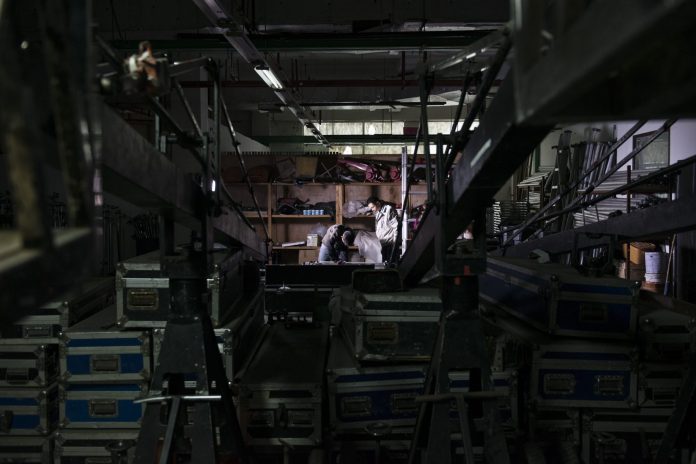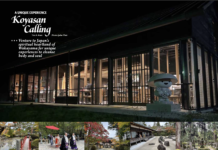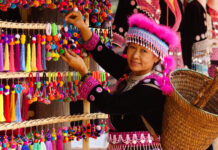
Is the Chinese film industry concentrated in Hengdian set to overtake Hollywood?
Text and Photos Zigor Aldama
Coming from the ultra-modern megalopolis of Shanghai, nobody would believe that a four-hour bus ride through eight-lane expressways, followed by a bumpy, mostly unpaved road would lead to the Chinese version of Hollywood. Hengdian, a city of around 200,000 people in the eastern part of Zhejiang Province is where, astonishingly, around 20 percent of all Chinese movies and TV series are filmed.
“In the 20 years since filming activities started, some 1,800 titles have been produced here, including big hits such as Zhang Yimou’s Hero and Hollywood’s The Mummy: Tomb of the Dragon Emperor,” Hengdian Group’s spokesman Zeng Yuling says. “At any given time, up to 40 stories can be taking shape in our hundreds of sets. Last year alone, 250 directors worked in the city, where more than 50,000 people are registered as actors.”
It soon becomes clear that Hengdian is no ordinary city. In fact, its architecture seems tailor-made for movie sets. Its buildings form a collective of 5,000 years of Chinese history: palaces from every dynasty, which once allowed former emperors to entertain concubines without the interruption of anti-corruption campaigns; lavish European colonial-era mansions, which once harboured gangsters and libertine women; the cobblestone streets where Kuomintang flags were not banned, where atrocities committed by Japanese imperial soldiers were witnessed. Finally, there is the contemporary addition of Mao Zedong’s portraits rising on “new” China’s edifices. If that wasn’t enough, a replica of Beijing’s old Summer Palace has just been built. The city also plans to add a “traditional Shanghai” street and a European mini-city. It may sound excessive, but it’s never too much when it leads to burgeoning business. “Right now, there are 56 crews waiting to film here, and sometimes there are 12 waiting to shoot on a certain set,” Zeng shares with pride.

China’s audiovisual industry has entered a golden era. In 2016 – even though the growth in revenue declined from the 48.7 percent high recorded in 2015 – the box office still saw a 3.7 percent increase, and raked in a record RMB45.7 billion (USD6.6 billion). If growth keeps at this pace, it will overtake the United States’ film industry in 2019. In fact, it has already done so in terms of the number of screens: 40,917 compared to 40,759. According to official statistics, TV dramas add RMB25 billion (USD3.6 billion) to the value of the Chinese market, an increase of 17 percent per year.
Hengdian wants to cash in, and it has everything to succeed. “Three decades ago, this was just farmland where people even had trouble surviving,” Zeng explains. “Then, the government decided to follow a different development path and chose to attract the booming film industry, rather than building manufacturing facilities. They created all the infrastructure and today, still charge no fees for shooting here, because the authorities believe that it creates jobs and brings revenue through taxes levied on the service industry.”
Almost 300 studios have established representative offices in Hengdian, and around 700 companies make up the fabric of businesses supporting the industry. There are furniture manufacturing artisans, made-to-order imperial costume companies, vintage car collectors who rent out their vehicles, and huge warehouses specialising in all kinds of equipment. Unsurprisingly, the business also attracts many young actors looking to make their fortune. Sadly, as the 2015 film I Am Somebody showed, most fail miserably. Zhang Yiguo knows that well. Himself an actor, he owns a representation agency in the centre of town, and receives scores of new applicants every day, with many leaving daily, too.
The walls of his office are full of casting photographs showcasing men and women with broad smiles and dramatic frowns. “Most will barely survive as extras, because they can just hope for a character with a sentence or two,” Yiguo says, explaining: “There are certain conditions to be met. First, you need to speak perfect Mandarin. Then, you better be beautiful or so ugly that nobody can take your part. Connections help a lot, and you must be patient. Most come from provinces where dialects give them a strong accent and they hardly know anyone in the industry.”
Yao Shan is one such aspiring actress. She comes from the southern province of Guanxi and belongs to the Yao ethnic minority. “I started as an extra earning just the minimum of RMB70 [USD10] per day. It was hard to get by,” she recalls. Then she realised that the skills she attained while performing as a horse rider in a circus could work in her favour, and earn her a higher income as a stuntwoman. Now she earns three to four times her original wage as a stunt double in action scenes.
On the set of The Hypnotised Hypnotist (被催眠的催眠师) she gets ready for a knife fight. It’s not an easy one; a colleague broke into tears after hurting herself in one of the takes. Outside the replica of a 1930s courtyard house, on a bitterly cold day with stubborn rain making everything more difficult, the unit director is losing his patience. The lead actress has just finished shooting her close-ups and the young stuntman who has to serve as her double (wearing a funny wig) can’t get the strikes right. Yao comes to the rescue as soon as she finishes getting dressed in her role as a peasant. One take is all she needs, and the film crew can move onto the next scene.
Not far from this set, yellow lighting bathes a Victorian-era building in an imitated sunrise. Inside, Jadie Lynn is enjoying a very different life. She’s one of the lead characters in the TV drama The Punisher (制裁者联盟), which combines fantasy elements with a typical love story. At the age of 24, Lynn is already a success. She won a Sino-Korean TV talent competition for supermodels, and has starred in a movie. She is represented by the company owned by Jackie Chan.

“China is a very promising market, but also highly competitive, so I have to keep studying to stay ahead of the curve,” she says. To do so, she trains in martial arts and has improved her acting skills through workshops in the US. In Hengdian, Lynn is one of the few professionals fluent in English – a pitfall that has become a problem for the city’s international ambitions. “But opportunities are in China, where budgets for films and series are growing fast,” says Lynn.
The set of War Against Bandits (打土匪) proves her point. Here, about 100 extras holding all kinds of guns wait for the narrow street to get filled with the explosives needed to replicate artillery shells for a scene in which they attack Communist forces during the Civil War. They’ve rehearsed twice already, and the unit director doesn’t look happy, but the light is fading and there are other crews waiting to shoot at one of Hengdian’s most sought-after stages. The special effects staff are frantic. On a loudspeaker, the man in charge of the extras barks instructions: “It’s an action scene! You need to look furious! Do not stop midway!” Four cameras, two still and another pair handheld, record everything from different angles. “There is no second chance today,” an operator warns.
And… action! The mayhem unfolds. A crowd of armed men storm the alleyway and an enormous ball of fire causes a flood of heat to rush into the set. The cameramen struggle to avoid being hit or burnt while focusing on the lead characters. Finally, everything goes according to plan.
And… cut! Smiles break out among sweaty brows. There is some applause. “It has to look spectacular, because audiences are getting tired of stories set in this era,” the unit director says. “We have to try to give them something they haven’t seen before.” And therein lies one of the biggest problems of 21st-century films and TV dramas. Zhang Bingjiang, director of North by Northwest, explains: “There is a worrying lack of originality in the scripts. The industry has grown very rapidly, but also in a chaotic way. Investors only look for money, while censorship curtails creativity. There are so many red lines not to be crossed that many choose to stay safe and dull.”
Audiences seem to agree. Even the highest grossing movie of all time, The Mermaid, has been bashed for its poor script, awful effects and even worse acting skills, coined “emoji-acting”. Zhang Yimou’s latest movie, The Great Wall, which stars Matt Damon, scored a meagre five points on the popular film review website, Douban. “The only reason why Chinese people watch Chinese movies is because the government restricts the number of foreign films – 34 at present – that are allowed to be shown in the country,” Zhang admits.
Superstar Fan Bingbing agrees: “We are copying the American model, with a lot of money invested in some movies. Technical skills and resources are world class,” the actress shares. “The problem is that there are many bad stories, investors know nothing about storytelling, and the market has not yet matured. Maybe that’s also the reason why our films don’t succeed abroad.” Hengdian industry leaders are conscious of this and are trying to woo foreign filmmakers. “As it happened with the industry and technology, we can learn a lot from them,” Zeng says.

Still, opportunities are limited because the city’s sets are designed to stand as a backdrop for “classic” Chinese stories. For example, not far from where the Kuomintang forces finished their battle against the Communists, martial arts specialists fight in one of the scenes in the making of The Honour of the Tang Dynasty (大唐荣耀), set 1,400 years ago. Indoors, The Lonely Hero of the Desert (大漠孤侠) film starts to shoot with characters well-known to the genre: bloodthirsty emperors, foxy concubines, and conspiring eunuchs. But first, director Mai Tian and the cast perform a solemn Buddhist ceremony. He wants to drive away one of the facts Deloitte has pointed out: that 70 percent of all stories filmed in China never make it to the commercial “big” screen. In that sense, the fate of much of the hard work done on set goes the same way as the many failed actors who slink back out of Hengdian, and into obscurity.
For more stories and photographs from this issue, see Asian Geographic Issue 124, 2017










